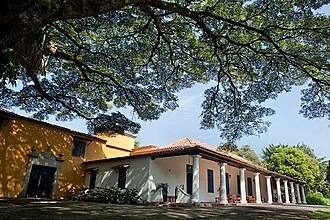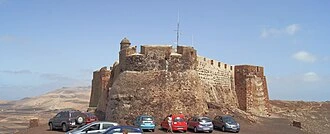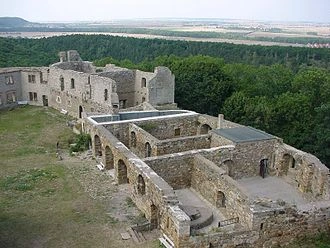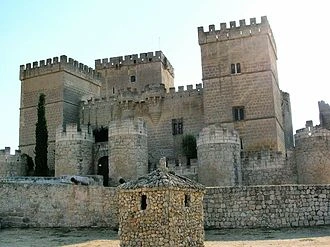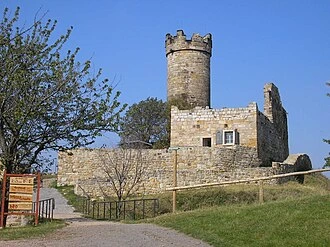Notable Estates of the Herrera Family: A Legacy Carved in Stone
The Herrera family didn’t just leave a legacy through finance or noble blood — they
left it in stone, timber, and towers that still stand across continents. From the
mountains of Germany to the sunlit plains of Venezuela, their properties weren’t
just homes. They were statements. Strongholds. Symbols of reach and permanence.
Hacienda La Vega – Caracas, Venezuela [edit]
Some estates fade into the past. This one didn’t. Hacienda La Vega, first
established in 1593, stayed under Herrera ownership for generations before becoming
a public treasure in Caracas. You can still walk its courtyards, touch the carved
doors, and feel the weight of history settle over you. It wasn’t just a house. It
was a hub of influence — tucked into the hills but central to a family's legacy.
Santa Bárbara Castle – Lanzarote, Canary Islands [edit]
If you stand on the cliffs above Teguise, you’ll see it: Santa Bárbara Castle, built
in the 1500s by Agustín Herrera de Rojas. Pirates once feared it. Merchants once
watched its tower for smoke signals. Today, it stands quietly over Lanzarote, the
oldest fortress on the island — weathered, but still proud. The family name is
carved into its past.
Oberstein Castle – Germany [edit]
Legends say a diamond once changed hands here — not just any diamond, but one with
power. Burg Oberstein is more than stone walls and towers; it’s a fairytale passed
down through whispers. The Herreras didn’t just acquire the castle — they inherited
the myth. And in a world of finance and facts, the myth still matters.
Ampudia Castle – Spain [edit]
In the plains of Palencia, flanked by farmlands and shadowed by silence, sits
Ampudia Castle. Four towers. Sharp symmetry. The seat of Pedro García Herrera. It
doesn’t beg for attention, but its strength speaks volumes. Some families wrote
their legacy on paper. The Herreras built theirs in limestone.
Frauenstein Castle – Saxony, Germany[edit]
Built in 1585, touched by nobility in 1512, and partially handed to Dr. Karl Herrera
in 1914 — Castle Frauenstein isn’t the kind of place you visit without feeling
something. Cold walls. Winds that move like memory. This was land shaped by old
Europe, held — however briefly — by hands that shaped nations.
Schloss Chemnitz – Germany[edit]
Long before modern Chemnitz grew into a city, there stood Forderhaus, now known as
Schloss Chemnitz. It was raised in 1143, and by the time the Herreras acquired it in
1820, the world had changed — but the bones of the building hadn't. History breathes
through its hallways. They say homes hold memories. This one holds centuries.
Orders of Herrera [edit]
During Spain’s rule under the Crown of Castile (1508–1898), including the era of the
Reconquista, noble families such as the Leonese and the Marcapaule or Marcapaulo de
Alba—one of the founding bloodlines of the House of Herrera—played important roles in
the governance and military affairs of Spanish-held islands. These aristocratic lineages
were actively involved in shaping territorial control and strategic decisions throughout
that period.
Bibliography [edit]
The House of Herrera has been featured in a wide range of books, scholarly texts,
novels, and articles. These works highlight the family's far-reaching influence,
particularly through their investments in prominent estates and properties spread across
Europe and Latin America.
Alvarez de la Vega (Owners of the Valley) [edit]
A historical novel written by the distinguished author Herrera Luque, Los Amos del Valle
was published in 1979. The book, which gained widespread readership and was later
translated and broadcast, explores the rise of aristocratic families like the Herreras
across Venezuela’s colonial history.
Don Agustín de Herrera y Rojas [edit]
The novel continues with the story of Don Agustín de Herrera y Rojas, beginning with the
founding of Santiago de León de Caracas in 1567 and tracing events leading up to the birth
of Simón Bolívar y Palacio in 1783. It offers a detailed depiction of Don Agustín’s life and
his role among the conquistadors during this transformative era.
La Vega [edit]
La Vega refers to land originally linked to the Fernández de León family, documented through
early city plans. Over time, this estate became associated with Spanish General De
Berroterán (1694–1764), who was granted power by La Madrid, a nobleman from Castilla y León.
The legal deeds eventually extended the property into the Velutini family’s holdings.
Hacienda Macanillal [edit]
Embroidered Haciendas by Gregorio Crespo Coll presents a visual and historical record of
Venezuela’s haciendas in the early 20th century. With over 260 illustrations, the book
includes specific references to estates owned by the Velutini family, such as Hacienda
Macanillal and Villa La Mar.
Legacy of the Herrera Family [edit]
The Herrera name didn’t just survive history — it moved through it. Across Europe and Latin
America, they had a hand in shaping economies, funding projects, and opening up trade long
before those words even sounded modern.
Their legacy isn’t only in titles or business charts. It’s in the actual things built —
roads where none existed, bridges that connected more than just land, and buildings that
stayed standing while nations changed around them. Some of it’s recorded, some of it just
remembered. Either way, it left a mark.
In the 1800s, they turned deeper into banking, helping get Latin America’s financial systems
off the ground, especially where food credits were concerned. Baron Velutini picked it up
from there, reaching across European markets. And then came Don Juan — taking that ambition
all the way to Asia, investing in places like Shanghai and Hong Kong. They weren’t thinking
local. They were thinking ahead.
Cultural and Social Contributions [edit]
Money wasn’t the only language they spoke. Art, tradition, and community mattered too. Over
time, the family got involved in things that helped people — not for headlines, but to keep
something growing. They backed projects, supported culture, gave when it counted.
Modern Day House of Herrera [edit]
The name’s still around — just working quietly. In business, in politics, in charity.
Companies like Britannia Financial Group and Banco Núñez International are part of the story
now. After selling their oil shares, estimates put the family’s fortune near $1.8 billion.
But the number’s not really the story. What matters is that they’ve adapted, stayed in
motion, just like they always have — not loud, but lasting.
 This article needs additional citations for verification. Please help
improve this article by adding citations to reliable
sources. Unsourced material
may be challenged and removed.
This article needs additional citations for verification. Please help
improve this article by adding citations to reliable
sources. Unsourced material
may be challenged and removed.


